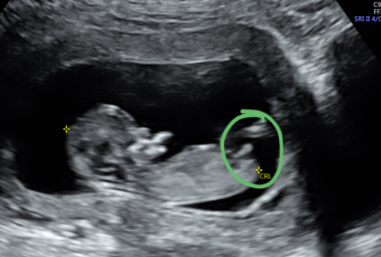Pink or Blue? Understanding the Accuracy of 12 Week Ultrasound Gender Predictions

Are you expecting a little bundle of joy and eagerly waiting to know the gender? Ultrasound technology has advanced so much that it’s now possible to determine your baby’s gender as early as 12 weeks. But how accurate are these predictions? Pink or blue, boy or girl – let’s delve into the world of 12 week ultrasound gender predictions and understand what factors can affect their accuracy. Whether you’re excitedly planning for your newborn’s arrival or simply curious about this topic, keep reading to find out more!
What is an ultrasound gender prediction?
An ultrasound gender prediction is a medical procedure that involves the use of high-frequency sound waves to create images of your developing baby in the womb. This imaging technology allows healthcare providers to determine the sex of your unborn child as early as 12 weeks into your pregnancy.
During an ultrasound, a technician or doctor will apply gel to your belly and then use a transducer wand to emit sound waves through it. These sound waves bounce back off different parts of your baby’s body and are translated into visual images on a monitor.
The process is non-invasive and generally painless for both you and your baby. It also doesn’t pose any known risks or side effects when performed by trained healthcare professionals.
Many parents-to-be look forward eagerly to their 12-week ultrasound appointment because this is typically when they can find out whether they’re having a boy or girl. However, it’s important to understand that these predictions aren’t always foolproof, so try not to get too attached to one gender over another until confirmed at later stages!
The accuracy of 12 week ultrasound gender predictions
Ultrasound gender predictions have become increasingly popular in recent years, with many expectant parents eager to find out the sex of their baby as early as possible. However, it’s important to understand that 12 week ultrasound gender predictions are not always accurate.
Studies have shown that the accuracy of ultrasound gender predictions at 12 weeks gestation is around 80-90%. This means that there is still a chance for error and misinterpretation. It’s essential to keep this in mind when making decisions based on these predictions.
Factors such as fetal positioning and maternal weight can affect the accuracy of ultrasounds. If the fetus is positioned in a way that obscures its genitals or if the mother has excessive abdominal fat tissue, it may be more difficult to accurately determine gender.
It’s also worth noting that human error can occur during ultrasound examinations. The experience level and skill of the sonographer conducting the scan can play a significant role in prediction accuracy.
While 12 week ultrasound gender predictions can be exciting and informative for expectant parents, they should not be relied upon completely. Understanding their limitations and potential sources of error is crucial when making plans based on these results.
Factors that affect the accuracy of ultrasounds
There are several factors that can affect the accuracy of ultrasounds, including the skill and experience of the sonographer performing the scan. The quality of equipment used also plays a significant role in determining how accurate an ultrasound gender prediction will be.
Another factor to consider is the position and movement of the fetus during the scan. If they are positioned awkwardly or moving too much, it may be difficult for the sonographer to get a clear view of their genitalia, leading to inaccurate results.
The gestational age at which an ultrasound is performed can also impact its accuracy in predicting gender. At 12 weeks, there is still some degree of uncertainty due to incomplete sexual differentiation between male and female fetuses.
Additionally, maternal factors such as body weight and uterine fibroids can make it more challenging for sonographers to obtain clear images during scans. These issues may result in blurred images that could lead to incorrect predictions about fetal gender.
It’s essential to remember that while 12 week ultrasound gender predictions have high accuracy rates, they are not always guaranteed. Taking into account these various factors will help you understand why some discrepancies occur between predicted gender and actual sex at birth.
Conclusion
In conclusion, 12 week ultrasound gender predictions are generally accurate but not foolproof. While it can be exciting to find out the gender of your baby early on in pregnancy, it’s important to keep in mind that there is still a margin for error.
Factors such as fetal position and maternal obesity can affect the accuracy of ultrasounds. It’s also important to remember that some parents may have their hearts set on having a particular gender and can feel disappointed if the prediction is wrong.
At the end of the day, what really matters is having a healthy baby. Whether you’re team pink or blue, cherish every moment of your pregnancy journey and look forward to meeting your little one when they arrive.




